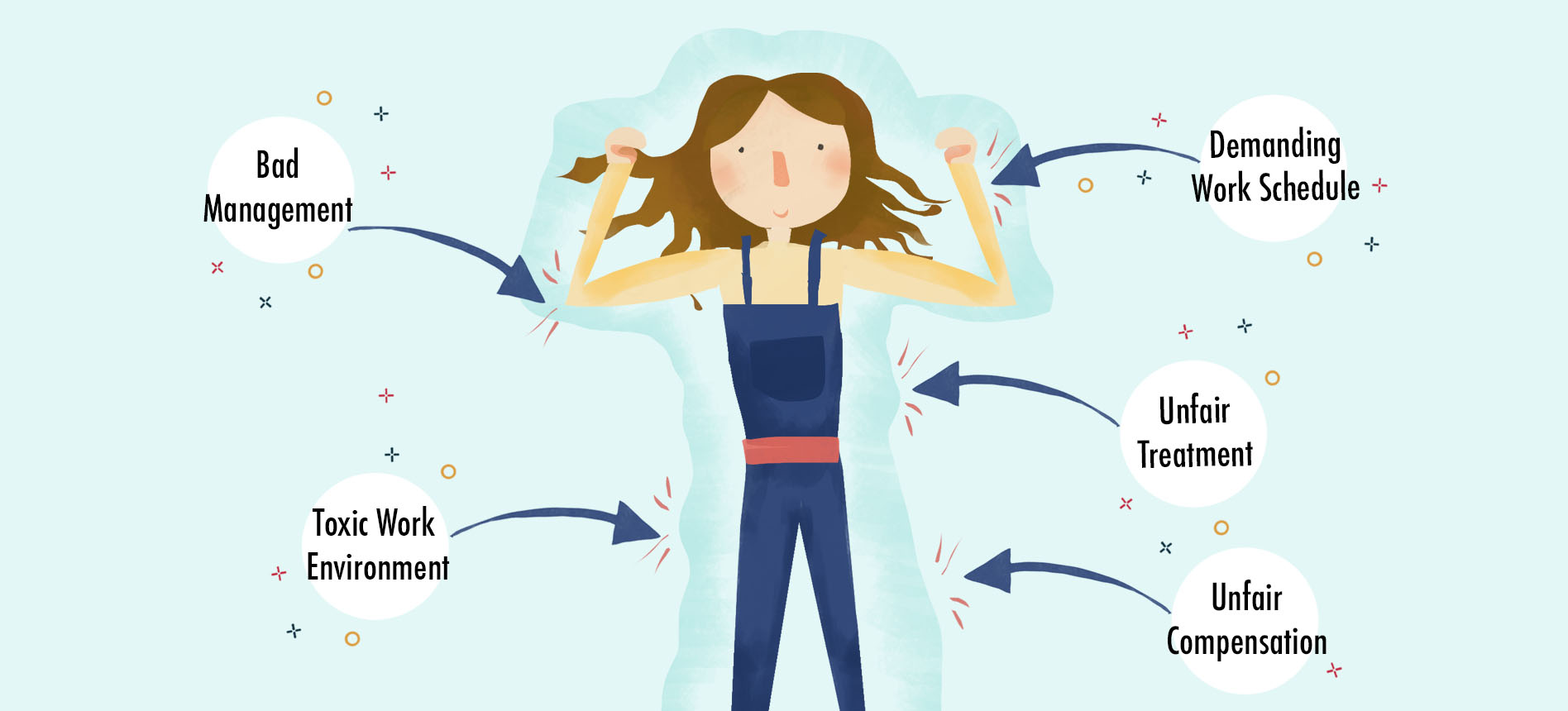Work-related stress is a serious issue that can cause a lot of harm to both employees and employers. Left untreated, it can lead to decreased productivity, job dissatisfaction, health problems, and even turnover. That’s why employers need to have a plan in place for how to handle an employee off work-related stress. In this blog post, we will discuss the different types of work-related stress, symptoms of work-related stress, and tips for HR leaders on how to handle an employee with work-related stress.
Understanding Work-related Stress

Work-related stress is a type of stress that is caused by the work environment. It can be caused by factors such as long hours, tight deadlines, unrealistic expectations, and job insecurity. Work-related stress can lead to a variety of health problems, including anxiety, depression, heart disease, and ulcers.
Degrees in Work-related Stress
There are three degrees of work-related stress: mild, moderate, and severe.
- Mild work-related stress is the most common and can be managed with some lifestyle changes and relaxation techniques.
- Moderate work-related stress requires more significant lifestyle changes and may also require medication to manage.
- Severe work-related stress is the most serious and can lead to health problems if not treated.
Types of Work-related Stress
There are two types of work-related stress: acute and chronic.
- Acute work-related stress is short-term stress that is caused by a specific event, such as a deadline or a difficult project.
- Chronic work-related stress is long-term stress that is caused by factors such as a high-pressure job or an unstable work environment.
Symptoms of Work-related Stress
The symptoms of work-related stress vary from person to person. Some common symptoms include:
- Headaches
- Muscle tension
- Trouble sleeping
- Stomach problems
- Feeling anxious, irritable, or depressed
Common Causes of Work-related Stress

There are a variety of factors that can cause work-related stress. Some common causes include:
- Job insecurity
- Long hours
- Unreasonable deadlines
- Unrealistic expectations
Handling Employee Off With Work-related Stress

It comes upon the organization to address work-related stress because employees are assets to the organization. However, employees also have a role to play in managing their stress levels.
Three-step Strategy For HR Leaders
Here, the role of HR leaders is to provide support to employees who are off work with stress. There are a few key things that both leaders and employees can do to support employees who are off work with stress:
- Identify the causes of stress: It’s important to identify the factors that are causing an employee’s stress. This can be done through a variety of methods, such as interviews, surveys, and focus groups.
- Provide resources to help employees cope: Once the causes of stress have been identified, HR leaders can provide resources to help employees cope. This may include information on relaxation techniques, time management, and stress management.
- Develop a plan to prevent future stress: Once the causes of stress have been identified and resources have been provided to help employees cope, HR leaders can develop a plan to prevent future stress. This may include changes to the work environment, such as flexible hours or a more relaxed dress code.
Tips For Employees Off With Work-related Stress

There are a few key things that employees can do to manage their stress levels while taking off:
- Communicate with your supervisor: Communicating with your supervisor about your stress levels can help to identify potential solutions. It will help you rebound without losing enough time.
- Don’t mind a break: Taking a break from work, whether it’s a mental health day or vacation, can help employees recharge and come back to work refreshed.
- Identify healthy coping mechanisms: Identifying healthy coping mechanisms, such as exercise, can help employees manage their stress levels. So that you can resume work with more energy and power.
Tips For a Healthy And Productive Work Environment

There are a few key things that both employers and employees can do to create a healthy and productive work environment:
- Monitor stress levels: Monitoring stress levels, both individually and as an organization, can help to identify potential sources of stress.
- Promote a healthy lifestyle: Promoting a healthy lifestyle, such as exercise, healthy eating, and proper sleep, can help to reduce stress levels.
- Maintain clean and comfortable workspace: A clean and comfortable workspace help employees feel welcomed and at home.
- Encourage breaks: Encouraging employees to take breaks, whether it’s a mental health day or vacation, can help them recharge and come back to work refreshed.
Helping Employee Resume Work After Stress Leave

The organization has a responsibility to help the employee resume work after stress leave. A few key things that both employers and employees can do to ease the transition back to work include:
Understand: It’s important to understand the reasons why an employee was off work and what they may be feeling upon their return. Keeping this in mind may help you understand their oncoming challenges better.
Communicate: Communicating with the employee about their return to work date, expectations, and any accommodations that have been made can help to reduce anxiety. This will give employees a sense of job safety and security in their minds.
Take it slow: Returning to work gradually, such as working part-time hours or from home, can help the employee ease back into the workforce. As they’ll need some time to gradually restore their energies and deliver at their previous performance level.
Set Achievable Targets: Setting achievable targets, such as completing a certain number of tasks each day, can help the employee feel successful and motivated. Also, this step-by-step approach will help employees clear and sorted in their minds.
Motivate and Praise: Motivating and praising the employee for their achievements, no matter how small, can help to boost morale. It further shows the employee that their efforts are appreciated. As a result, they’ll try putting on a better show to as not to let down their considerate bosses.
Predicting Implications of Unaddressed Work-related Stress

If left unaddressed, work-related stress can lead to a variety of problems, such as:
- Decreased productivity: When employees are under stress, they may have trouble concentrating and be less productive.
- Increased absenteeism: Stressed Employees may take more sick days or take longer to return to work after an illness.
- Job dissatisfaction: Employees who are under stress complain of a lack of satisfaction with their jobs. They will further attribute their problems to job dissatisfaction.
- Lower morale: Stress can lead to negative emotions, such as anxiety and depression, which can lower morale. And an employee with low morale seldom can perform well at their workplace.
- Health problems: Stress can lead to physical health problems, such as headaches and stomach problems. It further goes on to hamper the productivity of an employee.
- Turnover: Employees who are under stress may be more likely to leave their jobs. It is because they feel stuck and helpless in their present job.
It’s an employer’s responsibility to address work-related stress because employers have a duty of care to their employees. By failing to address work-related stress, employers may be putting their employees at risk of developing mental health problems. Thus, addressing work-related stress can help to improve the overall health of employees and help the organization in the long run.
Monitoring Stress Levels At The Workplace

There are a few key things that HR leaders can do to monitor stress levels at work:
- Conduct regular surveys: Conducting regular surveys is a great way to identify employees who may be experiencing stress.
- Monitor absenteeism: Monitoring absenteeism can help to identify employees who are struggling to cope with stress.
- Encourage open communication: Encouraging open communication between employees and supervisors can help to identify employees who are experiencing stress.
How Mantra Care EAP Can Help You
Mantra Care’s Employee Assistance Program (EAP) can help employees who are struggling with work-related stress. Our EAP provides a variety of services, such as:
- Counseling & therapy
- Work-life balance support
- Stress management training
- Yoga and mindfulness training
- Food chart and nutrition counseling
Also, under Mantra Care EAP, we help employees by providing a confidential counseling service for employees who are struggling to cope with stress. Our team of qualified counselors can provide support and advice on a range of issues, including work-related stress. To find out more about our services, please visit our website or contact us today.
Conclusion
Work-related stress is a serious issue that can lead to a variety of problems for both employers and employees. However, by taking action to address work-related stress, employers can create a healthier and more productive workplace. HR leaders play a key role in addressing work-related stress, and there are a variety of things they can do to support employees who are off work with stress. Finally, employees also have a role to play in managing their stress levels. By taking action to address work-related stress, employers and employees can create a healthier and more productive workplace.
A Word From MantraCare Wellness
Employee wellness programs are the key to improving employee motivation, productivity, and retention. At MantraCare Wellness, we have a team of health experts, counselors, and coaches who serve corporate employees with 10+ wellbeing programs including EAP, Employee Diabetes Reversal, Corporate MSK, PCOS, Employee Fitness, Corporate Yoga, Employee meditation, and Employee Smoking Cessation.


